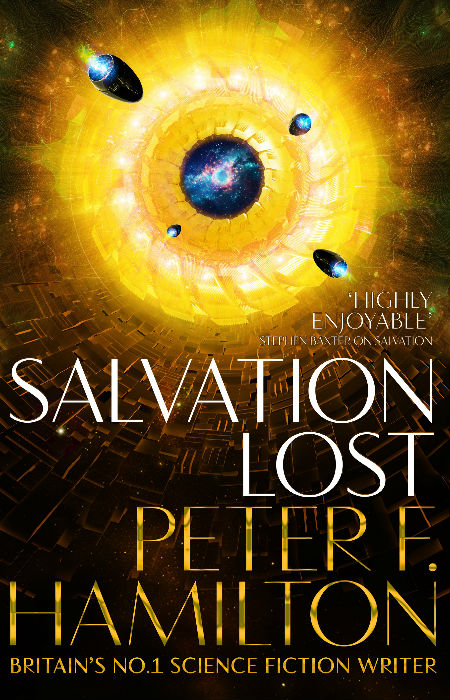
One of the great and multitudinous gifts of master science fiction storyteller Peter F. Hamilton is how masterfully well he can hold stories separated by time and space together in such a compellingly immersive manner.
Time and again, across his Commonwealth saga and sundry other engrossing tales, he has slowly but surely unveiled characters and plots that are fiendishly complicated and whose execution must surely demand a massive, wall-spanning noticeboard, pockmarked by endless Post-It Notes and coloured pins, without sacrificing one gram of accessibility or emotional resonance.
It’s a glorious feat which he manages once again in Salvation Lost, the second entry in his The Salvation Sequence trilogy which began with Salvation (2018) and which conclude with 2020’s Saints of Salvation, in which twenty-third century humanity enjoys a galaxy-swarming life amid the stars, courtesy of some cutting-edge technology such as quantum entanglement portals which cut travel across Earth and between distant planets to seconds.
In some respects, it’s a blissful utopia, a time of plenty borne by technological advance and an excess of resources and opportunity driven by the discovery of planet after planet and their inevitable exploitation; however, inequality has not been banished with the richest ten per cent ruling the destiny of the remaining ninety per cent much as their ridiculously monied contemporaries do now.
But trenchant as those problems might be, they are not, as it turns out, humanity’s greatest threat; a far greater and far more permanent existential and physical threat lies in the once-benign form of the Olyix, a race who came bearing roses and bon mots of kindness and galactic brotherhood but who intend to harvest every last one of the 12 billion people on Earth to take to their Gods at the End of Time.
“Jessika gave her a puzzled look. ‘Defeat them?’
‘Yeah. Defeat them. Shoot their Deliverance fleet out of the sky. Blow up the Salvation of Life. Nuke this enclave of theirs back into whatever stone age they had.’
‘You can’t.’
…
‘So what do you expect us to do?’ Emilja demanded. ‘ You clearly have some idea. Whatever sent you here had a reason.’
‘To warn you,’ Jessika said. ‘To stall the invasion long enough that some of you can flee out into the depth of space. Your habitat construction ability is impressive. You will be able to build your refuges in the emptiness between the stars. This way your species will survive.'” (P. 43)
They are religious fanatics but ruthlessly, fearlessly technologically advanced ones, and after their real intent is unveiled by an expedition to a far off planet which finds one of their transport ships stuffed full of cocooned humans – their brains are alive but little else of them is recognisably human – Earth must grapple with the fact that they mean us mortal, civilisation-ending harm.
We are hardly the first casualty of their do-gooding fanaticism – horrifying as their theology and methods are, the Olyix actually believe they are doing the Lords’ work – with countless other species such as the Nèana, who have come to Earth to help us disguised as, rather unsettlingly, humans, all forced to flee before the mighty onslaught of a race whose technology has not dispensed with its religiosity but rather amplified it.
The Nèana, like other surviving races – survival is a relative concept with many reduced to rump populations barely hanging on to life – have fled to the space between stars, hiding away in the darkness in a bid to keep their civilisational clocks ticking over until they can take revenge of their oppressors.
But humanity, good old obstinate, argumentative, ludicrously tenacious humanity is having none of this type of talk and decides to take the fight to the Olyix, even as it becomes manifestly clear that the right is a wholly unequal and possibly ultimately doomed one.

Or is it?
As Salvation Lost spins its tale of an Earth under attack and with it humanity’s long-held sense of manifest destiny and inviolability, we come to appreciate through a thread of the story told in a distant future, that there might be some hope left yet.
In this thread which sits 10,000 years hence from the horrors of the Olyix invasion, humanity appears to have succeeded in thwarting the very worst of their invader’s intent.
They have had to abandon Earth and the Sol system but they are alive, a civilisation spread across the galaxy which is perpetually on the run from the Olyix who always seem to find and best them.
Even so, humanity, which worships the original team who masterminded the fightback against the Olyix in the present day such as Callum, Kandara, Jessika and Yuri as Saints, remains committed to finding the Enclave from where the Olyix’s Deliverance ships are launched, wiping their enemy from the face of the galaxy and reclaimed their rightful safe place at their currently-relinquished corner of the galaxy.
While this thread could be viewed as the mother of all spoilers, it sits easily alongside the twenty-third century storyline, the two narrative lines dovetailing neatly into each other in a way that robs neither of them of their storytelling power or emotional resonance.
“‘Thanks,’ Callum said abruptly. ‘We need to get back, now.’ He gripped the handrail harder and slowly swung his body around a hundred and eighty degrees until he was pointing back the way he’d come. Then he started pulling himself along, gliding between handrails. He couldn’t stop grinning.
‘So?’ Eldlund said.
Callum’s excitement overrode everything: freefall nausea, worry about the invasion – ‘It’s amazing! They don’t realize what they’ve got.’
‘Uh … what have they got?’
‘The perfect arkship-killer missile.'” (P. 315)
Salvation Lost, which contrasts the stories of landed gentry such as Gwendoline Zangari – her family sits at the pinnacle of Earth’s rampant inequality, the engine of its economic success and social malaise – and poor gang member Ollie, who simply wants a better life for his grandmother and younger brother Brik, triumphantly adds to the canon of Earth invasion tales, which are legion, by going deep into the lives of those affected by this cataclysmic event.
While the actions of the Saints, as future humanity knows them, drive the central focus of the narrative, it is the more intimate personal stories of Ollie and Gwendoline, and in the future Dellian and Yirella which give the novel a powerful sense of humanity.
This is not simply some sort of pulpy tale of Earth lost – though it is hardly that with Hamilton investing the story with a dire sense of mortality and staggering loss that can’t help but effect even as it takes your breath away – but of a world coming to grips with the fact that its taken imagined future will never be realised and that it might not even have one at all.
Salvation Lost is Hamilton at his best, weaving together narrative threads both galactically epic and deeply personal, a story infused with hubris and hope, and one that warns that we have much to fear from fanaticism and complacency and that whatever we think may lie ahead of us can never be taken for granted and must be fought for, whether now or in a future that may end up being nothing like we imagine.